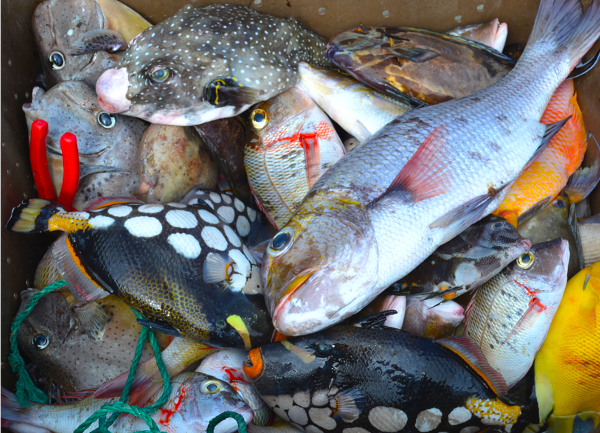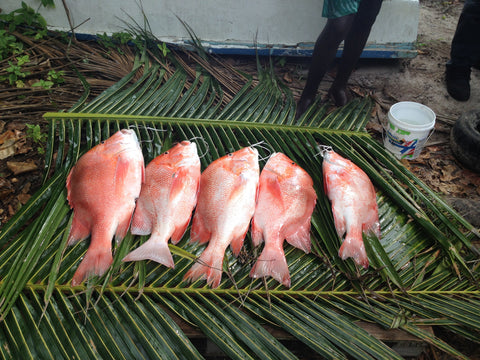
Last Easter, Australia saw one of its biggest rush for ‘cheap seafood’ leading up to festivities. With seafood exports having significantly declined due to the pandemic, and tensions with China, there was a much wider supply for local Aussie seafood and crustaceans.
All the while the Netflix documentary Seaspiracy - revealing the impacts of commercial fishing - was trending on the platform as one of its Top 10 most watched programmes. This 90-min film pours doubt on the idea of sustainable fishing, shines a spotlight on the aquaculture industry and introduces the notion of “blood shrimp”, seafood tainted with slave labour and human rights abuses.
If you haven’t watched it (or don’t have Netflix), here are 10 take-away facts to remember and share with others.
Fact 1: Oceans are our best allies in fighting against climate change
Many of us believe terrestrial forests are the lungs of the Planet. But it is our oceans - covering about 70% of the Planet and home to 80% of all life on Earth - that produce over half of the oxygen we breath. Phytoplankton forms the foundation of the food web for most marine life. They are responsible for half of the photosynthetic activity on earth, making them important to both their local and global ecosystems. Phytoplankton live near the surface of the ocean because they need sunlight like all green plants to process the energy of the sun through photosynthesis.
The Oceans are the biggest carbon sink on the Planet. 93% of all CO2 is stored in the ocean. Per acre, marine plants can store up to 20 times more carbon than forests on land. But a chocking 3.9 billion acres of seafloor is wiped out by bottom trawlers every year.
Since the beginning of the industrial era, our oceans have absorbed a tremendous amount of the CO2 emitted by humans through the use of fossil fuels. This means our oceans have helped save us time in the fight against climate change.
Fact 2: Say no to single use plastics, and Reduce Reuse Recycle
There is an estimated 150 million tons of plastic already floating in the sea, and an additional garbage truck load of plastic is dumped in the sea every single minute. Because of their molecular nature, plastics never biodegrade like organic matter does. Instead plastic breaks down into smaller pieces - known as microplastics - and contaminate the food chain suffocating species at all levels, from seabirds to fish, dolphins and whales.

Fact 3: If you haven’t already, boycott dolphin shows
Marine aquariums can be a great way to educate the public to the wonders of the ocean and sea creatures. However, we should all boycott entertainment parks that host shows with dolphins, sea lions and killer whales. Studies have shown serious behavioural impacts captivity has on these highly intelligent animals, from depression to dementia. The life expectancy of a dolphin in captivity is on average half the life span of dolphins in the wild. This industry also drives dolphin and whale massacres such as the ones happening in Taiji.
Fact 4: Watch for bluefin tuna in your sushi platter (and everywhere!)
Decades of commercial fishing - combined to an increase in seafood consumption worldwide and ever evolving fish capture technologies - have driven many fish species to critical levels. Today only 3% of pacific bluefin tuna remain. A simple solution to save the tuna is to stop eating it. Tunas are predators sitting high on top of the foodchain. Due to a process called "bioaccumulation" - which is the gradual accumulation of substances, such as pesticides or other chemicals, in an organism - the flesh of tunas and other carnivorous fish contain high levels of contaminants such as heavy metals, mercury, dioxins, plastic compounds, hexachlorobenzenes and PCB's. It is now common knowledge that eating tuna regularly exposes you to high levels of such contaminants.
Fact 5: Sharks are vital to oceans, and to humans
As apex predators, sharks have a crucial role in the food chain. Sharks keep oceans healthy by predating on the weak and dying. This way they control the propagation of bacteria and diseases among coral reefs for examples. For the first time, sharks are going extinct because of us. An estimated 50 million sharks are killed every year as by-catch, and the shark finning industry kills even more. This is not only bad for oceanic health, but it is bad for us. Sick reefs and oceans make sick fish and impact the ecosystem services our oceans provide for free to humans (source of food, tourism industry, storm protection, pharmaceuticals). Unfortunately, sharks have had bad press for years because of very few - but dramatic accidents - attacks on humans. But the numbers are trivial… sharks kill 10 people per year. Comparatively, people kill 11,000-30,000 sharks are killed per hour.
Fact 6: There is no such thing as sustainable commercial fishing
There are 4,600,00 commercial fishing vessels in the world. All or most are equipped with ever more accurate GPS technology to find fish to the most remote corners of the ocean. These vessels leave none of their targets behind, and what’s worse is - because they are so efficient at catching everything - these vessels also catch “unwanted” species - referred to as by-catch - resulting in 40% of their catch is thrown overboard. According to the Seaspiracy documentary, even award winning fisheries have shown high levels of by-catch - from porpoises, seals and seabirds. According to the Seaspiracy documentary, over 300,000 whales, dolphins and porpoises are killed as by catch every year. The Seaspiracy documentary shines a light on the unreliability of many ‘sustainable’ labels and certifications. It is just too hard to be sustainable when running something at such large scale as the commercial fishing industry.
Fact 7: The fishing and plastic pollution issues are intricately liked
A striking fact from the documentary was concerning the nature of most plastic in the ocean. Plastic straws are insignificant when it comes to plastic pollution. As it turns out, the movie states that 46% of the pacific garbage patch is made of discarded fishing nets, also called ‘ghost nets’. As they drift across our oceans and catch on organic matter, these ghost nets are extremely dangerous to marine life. Countless numbers of sea turtles, fish, whales and sharks die of suffocation or drown from these nets.
However, according to an article by Global Citizen the 2018 study quoted in the film was based on plastic that floats, and did not account for microplastics, tiny particles of plastic that often sink. For the ocean as a whole, a 2019 study from environmental charity Greenpeace found that fishing nets likely make up 10% of plastic waste.
Fact 8: Overfishing is the biggest threat to our Oceans (with climate change)
Seaspiracy highlights macabre facts about commercial fishing, including ones labelled sustainable. The most shocking being that 6 out of 7 species of sea turtles are either threatened or endangered due to commercial fishing. In the USA, 250,000 sea turtles are accidentally captured, injured or killed every year by fishing (due to by-catch). The fishing industry kills more animals in a day than oil spills in months. 2.7 trillion fish are caught every year, or up to 5 million caught every minute. Overfishing is not only emptying our oceans, it is also shifting the million year old balance our oceans depend on. For example, according to Greenpeace, Bottom trawling – the most devastating form of fishing there is – needs to be banned where corals grow and provide vital habitats for fish and the very basis of the oceanic food chain.
We know commercial fishing is emptying our oceans and causing long-term (sometimes irreversible) damages to habitats. However, the claim made by the movie that our oceans will be virtually empty by 2048 is highly contested by reviews and scientists. According to Dr Melnychuk from the University of Washington interviewed by the BBC "Overfishing is certainly a problem in many regions of the world, but in regions where fisheries management regulations are based on scientific evidence and properly enforced, most fish stocks are doing well". Today, "countless efforts are under way to repair the damage that has been done" (Prof Boris Worm).
Fact 9: You help coral reefs by eating less seafood
As with every ecosystems, there is a fragile balance on coral reefs, and all species of the reef depend on each other directly or indirectly. Fish have a crucial role in keeping corals alive. By grazing on seaweeds, herbivorous fish clear some space on the substrate for corals to settle and grow. Many studies have shown that overfishing of herbivorous fish systematically affect the abundance and diversity of corals on the reef, thus impacting the whole ecosystem, by affecting other species that feed on corals like butterfly fish. Many reefs worldwide have lost many of their large predators due to overfishing.

Fact 10: Eat LESS seafood, period.
We don’t think this statement should be addressed to everyone... According to Oceana quoted on the Guardian "Choosing to abstain from consuming seafood is not a realistic choice for the hundreds of millions of people around the world who depend on coastal fisheries – many of whom are also facing poverty, hunger and malnutrition.
However, it does apply to western countries.
Numbers don’t lie… according to Seaspiracy, fish populations are in decline to near extinction. 2.7 trillion fish are caught every year, to unsustainable levels. Historical data from the US halibut fishery show a shocking decline in catch. In the 1830’s a typical fishing boat caught 1-2 tons of halibut per day, but today the entire fishing fleet catches 1-2 tons across the entire year. The only way to help fish populations recover, is to eat LESS seafood, period.
Farm grown seafood is not the answer as it still drives environmental disasters (mangrove deforestation, water pollution) and does not solve the overfishing problem (fish still need to be fed with fish!).
When you do choose to eat seafood (on rare occasions), avoid any processed or frozen seafood, as it has most likely been caught and/or processed overseas, where corruption, slavery and illegal fishing are likely. Instead, choose fresh - Australian caught - seafood and favour species for which the population is healthy. Download the app “GoodFish” created by the Australian Marine Conservation Society to find which species are a better choice and which ones are to be avoided. Mussels and oysters for example are a great choice as they are low on the food chain and they are filter feeders (they feed on plankton and floating particles) so don’t required to be fed when grown for aquaculture.


Comments (0)
Back to Blog